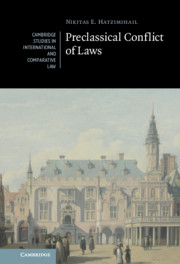Book contents
- Preclassical Conflict of Laws
- Cambridge Studies in International and Comparative Law: 153
- Preclassical Conflict of Laws
- Copyright page
- Dedication
- Epigraph
- Contents
- Figures, Tables and Maps
- Maps
- Acknowledgments
- 1 Introduction
- Part I History and Historiography in the Conflict of Laws
- Part II Current Concerns
- Part III Bartolus da Sassoferrato and the Conflict of Laws in the Middle Ages
- 7 “Nunc veniamus ad glossam”: Bartolus on the Conflict of Laws
- 8 The Political Context of Bartolan Conflict of Laws
- 9 Doctrinal Aspects of Bartolan Conflict of Laws
- 10 Bartolan Conflict of Laws in the Conceptual Battlefield
- Part IV Ulrik Huber and Conflict of Laws in the Early Modern Period
- Part V Epilogue
- Bibliography
- Index
- Cambridge Studies in International and Comparative Law
7 - “Nunc veniamus ad glossam”: Bartolus on the Conflict of Laws
from Part III - Bartolus da Sassoferrato and the Conflict of Laws in the Middle Ages
Published online by Cambridge University Press: 08 July 2021
- Preclassical Conflict of Laws
- Cambridge Studies in International and Comparative Law: 153
- Preclassical Conflict of Laws
- Copyright page
- Dedication
- Epigraph
- Contents
- Figures, Tables and Maps
- Maps
- Acknowledgments
- 1 Introduction
- Part I History and Historiography in the Conflict of Laws
- Part II Current Concerns
- Part III Bartolus da Sassoferrato and the Conflict of Laws in the Middle Ages
- 7 “Nunc veniamus ad glossam”: Bartolus on the Conflict of Laws
- 8 The Political Context of Bartolan Conflict of Laws
- 9 Doctrinal Aspects of Bartolan Conflict of Laws
- 10 Bartolan Conflict of Laws in the Conceptual Battlefield
- Part IV Ulrik Huber and Conflict of Laws in the Early Modern Period
- Part V Epilogue
- Bibliography
- Index
- Cambridge Studies in International and Comparative Law
Summary
Bartolus (or Bartolo in the vernacular) was born in either 1313 or 1314, in a village near the small town of Sassoferrato, in the March of Ancona – a territory forming part of the Papal States. He first studied law at the University of Perugia, where his most notable teacher was Cinus da Pistoia, a founding figure of the so-called School of Commentators.1 He then obtained his doctorate from Bologna in 1334, where his teachers included Oldradus da Ponte, Jacobus Buttrigarius, and Ranierus de Forlivio. After a brief judicial career in Todi and possibly Pisa, Bartolus begun teaching at Pisa in 1339 and finally joined the law faculty of Perugia in either 1342 or 1343 until his death in 1357.2 His students there included the other great Commentator Baldus de Ubaldis (1327–1400).
- Type
- Chapter
- Information
- Preclassical Conflict of Laws , pp. 219 - 251Publisher: Cambridge University PressPrint publication year: 2021

